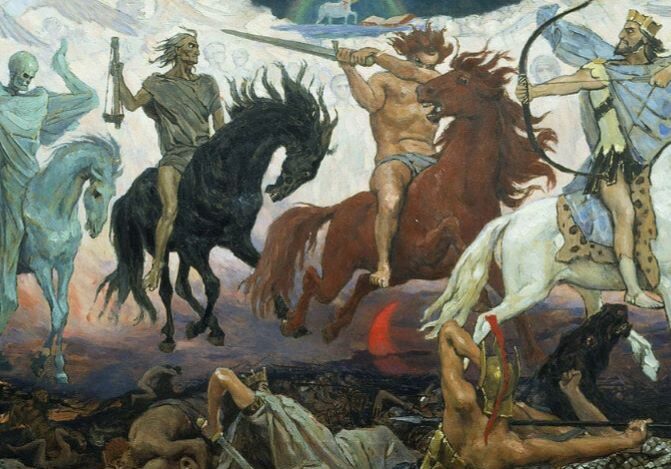Epsilon Theory PDF Download (paid subscribers only): The Grifters, Chapter 3 – Election Predi
The Grifters, Chapter 3 – Election Prediction
To learn more about Epsilon Theory and be notified when we release new content sign up here. You’ll receive an email every week and your information will never be shared with anyone else.
Continue the discussion at the Epsilon Theory Forum
20 more replies
The Latest From Epsilon Theory
DISCLOSURES
This commentary is being provided to you as general information only and should not be taken as investment advice. The opinions expressed in these materials represent the personal views of the author(s). It is not investment research or a research recommendation, as it does not constitute substantive research or analysis. Any action that you take as a result of information contained in this document is ultimately your responsibility. Epsilon Theory will not accept liability for any loss or damage, including without limitation to any loss of profit, which may arise directly or indirectly from use of or reliance on such information. Consult your investment advisor before making any investment decisions. It must be noted, that no one can accurately predict the future of the market with certainty or guarantee future investment performance. Past performance is not a guarantee of future results. Statements in this communication are forward-looking statements. The forward-looking statements and other views expressed herein are as of the date of this publication. Actual future results or occurrences may differ significantly from those anticipated in any forward-looking statements, and there is no guarantee that any predictions will come to pass. The views expressed herein are subject to change at any time, due to numerous market and other factors. Epsilon Theory disclaims any obligation to update publicly or revise any forward-looking statements or views expressed herein. This information is neither an offer to sell nor a solicitation of any offer to buy any securities. This commentary has been prepared without regard to the individual financial circumstances and objectives of persons who receive it. Epsilon Theory recommends that investors independently evaluate particular investments and strategies, and encourages investors to seek the advice of a financial advisor. The appropriateness of a particular investment or strategy will depend on an investor’s individual circumstances and objectives.
This commentary is being provided to you as general information only and should not be taken as investment advice. The opinions expressed in these materials represent the personal views of the author(s). It is not investment research or a research recommendation, as it does not constitute substantive research or analysis. Any action that you take as a result of information contained in this document is ultimately your responsibility. Epsilon Theory will not accept liability for any loss or damage, including without limitation to any loss of profit, which may arise directly or indirectly from use of or reliance on such information. Consult your investment advisor before making any investment decisions. It must be noted, that no one can accurately predict the future of the market with certainty or guarantee future investment performance. Past performance is not a guarantee of future results. Statements in this communication are forward-looking statements. The forward-looking statements and other views expressed herein are as of the date of this publication. Actual future results or occurrences may differ significantly from those anticipated in any forward-looking statements, and there is no guarantee that any predictions will come to pass. The views expressed herein are subject to change at any time, due to numerous market and other factors. Epsilon Theory disclaims any obligation to update publicly or revise any forward-looking statements or views expressed herein. This information is neither an offer to sell nor a solicitation of any offer to buy any securities. This commentary has been prepared without regard to the individual financial circumstances and objectives of persons who receive it. Epsilon Theory recommends that investors independently evaluate particular investments and strategies, and encourages investors to seek the advice of a financial advisor. The appropriateness of a particular investment or strategy will depend on an investor’s individual circumstances and objectives.










the cynicism is clear and i understand where it’s coming from. But this article assumes bad faith across a diverse set of actors (corporations of course, and Nate the person, and all those polling firms, AND all those thousands (millions?) of poll respondents) in a way that i don’t really see justified by the points made here. (I dunno, maybe it is well defined and i just can’t see it because i don’t like it because it doesn’t seem charitable, and we need some charity right now in how we approach each other. ) It rather feels more down the road of Pepe Silvia meme if you know what i mean. As such, the frame of the article as part of the grift series seems more man with hammer syndrome on ETs part. If anyone’s creating a cartoon “Nate silver” in order to drum up engagement, it seems as likely as not that the cartoon’s been invented right here. Which, you know… I’m engaging! So, good job i guess.
PS he definitely did look like a disheveled schlub, though. Felt pretty inappropriate to me tbh.
Friends, Wolfpack, Epsilon Theorists, lend me your ears;
The noble Ben Hunt hath told you that “Nate Silver” is a cartoon and a grifter.
I’m no expert on “Nate Silver”. I don’t really consume the core product however Ben defines it. But I’ll try to defend a friend, Nate Silver, whose last three pre-election bylines were these articles:
Ben's piece stipulates this, I know, but I find it unnatural to credit these articles to Nate while accusing "Nate's" model of dishonest oversimplification. I speak not to disprove what Ben spoke, if you catch my drift.The core criticism here, as I understand it, is that playing the election as a sporting event is a grift, and those who contribute in-game commentary are grifters. To me, that’s a very broad media critique, extending far enough beyond elections/538/Disney that I wonder how it misses Epsilon Theory… If that matters? Also, “Nate’s” model was pretty careful to lay out the possible distributions? If it were so, it was a grievous fault… ?
Between explicitly harmful grifts like the Kodak handout and N95 mask (non-) production and… Fivey Fox, my pitchfork is already headed in the former direction – and I must pause till it come back to me.
I appreciate your defense of a friend, but what you lay out here is my biggest problem with Nate Silver: he knows better. He knows that there is massive uncertainty embedded in his model. He knows that when the model says 90%, the real answer could just as easily be 50%. He knows that he is the public face of a statistical charade.
A little harsh on Nate, I would say. His model assumed the polling error in 2016 was random - which is what polling errors have tended to be over time, across many different elections, and seems to me like the most sensible ex-ante assumption here. Now we have two observations of the polling error in an election involving Trump going in the same direction, so maybe it’s not random. Or maybe it still is, hard to know for sure. And, of course we don’t know going into the election with any certainty if Biden is an 89.5% favorite, or a 71.3% favorite, or what exactly, we just know he’s probably going to win, but it’s not definite. So, you can criticize Nate for being overly specific if you want, but him pinning an exact number on it doesn’t seem any different than the bookies saying the Patriots are a 9.5 point favorite over the Jets. Yes, it is to stimulate debate/engagement/wagering, but what’s wrong with that? I don’t find it to be intentionally misleading in any way.
What’s intentionally misleading, imo, is using a fundamentally flawed and limited election model as the cornerstone of a large media initiative within Disney/ABC News to game-ify and cartoon-ify national elections. Nate Silver the person knows perfectly well how flawed and limited the election model is … that in truth the model doesn’t know whether the Pats are 9.5 point favorites or 0.5 point favorites … but he goes along with it anyway. I realize that comes across as harsh, but that’s my biggest problem here: he knows better, but does it anyway.
FiveThirtyEight is the functional equivalent of the Fox NFL Pregame Show, and Silver’s model has all the predictive power of a Terry Bradshaw pick.
But the model and Silver himself are presented to us by ABC News as so much more than that.
This is what I think is intentionally misleading.
Cynical? Maybe. Assuming bad faith? No.
Disney has never pretended to do anything other than what Disney does - find new ways to make money.
As for Nate, I’ve heard he’s a nice guy, and he is certainly very smart and creative. He certainly wouldn’t be the first nice, very smart and creative guy to think that he only sold his company but ultimately discovers that he sold his soul. That’s not bad faith. It’s just an old, sad story.
I think you’re misunderstanding what I mean by the strategic behavior we all have with polls today. It doesn’t mean we’re acting in bad faith (necessarily, although some might). It only means that both our responses and our decision to participate in a poll in the first place are made with an additional level of thought and gameplay.
“Everyone knows that everyone knows this is how polls are used today, that you are part of a larger political game that is distinct from the actual act of voting. This is the common knowledge of polling today, and as a result, no one provides “straight”, i.e. non-strategic, poll responses today. No one.”
Nate Silver knows it and at least some politicians know it. Here is some text from an e-mail I received from Tulsi Gabbard’s campaign in August 2019.
-
Sign up for YouGov and take a few surveys with them
- If you are called from an unknown number, remember that it could be a pollster. If you are selected to participate in a poll, make sure to specify if you're a registered Democrat or leaning Democrat and that you plan to vote for Tulsi in the primary election
Remember, the more online polls you take, the higher chance you have of being selected to take a poll on the 2020 Democratic Presidential Primary. So whenever you're asked to take a poll, take it! We have thousands of supporters in every state—if only a handful of us are selected for a poll, it can make the difference.TL/DR: It feels here like this note attacks the way Disney markets 538 to the average consumer. I don’t have a strong opinion but that seems like a reasonable take. While it’s somewhat of a straw man, I do feel it’s important to point out that 538 does offer plenty of value to a hardcore political junkie who knows how to interpret it.
My .02 is that during this election season, as a political nerd myself, I found 538 to be a useful but obviously not infallible part of a balanced media breakfast. Recent experience and various insiders’ Twitter feeds told us that Florida was hard to poll and that models would overestimate Biden’s chances. Trump’s messaging suggested that he might outperform with Latinos in NV, TX, and FL. We also knew that Parscale’s explicit strategy was to drive turnout from demographics that aligned with those of Trump’s base but had not previously voted, and that if it were successful, it could produce a Pro-Biden polling error in any model that was built to account only for historical rates of turnout.
Amidst all of the above qualitative and narrative information, the ability to refer to a purely quantitative “ticker” like 538’s forecasts (and prediction markets) helped form the relative value scaffolding for the narrative mosaic. I don’t think 538, in this way, is dissimilar from the various crudely constructed factor baskets and quantitative indicators that the investment banks publish for the equity markets. You may do all the bottoms up, qualitative research that you want, but on a day to day basis, understanding how value or momentum are moving relative to the prior period is by all means useful, even if it is not a precise, standalone representation of every exposure that’s driving your book.